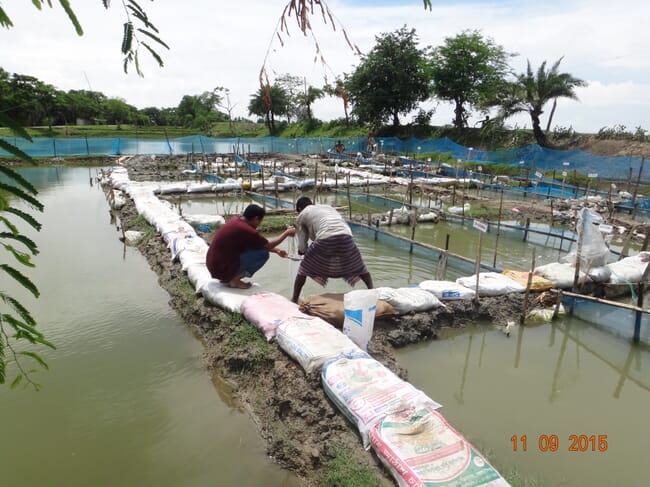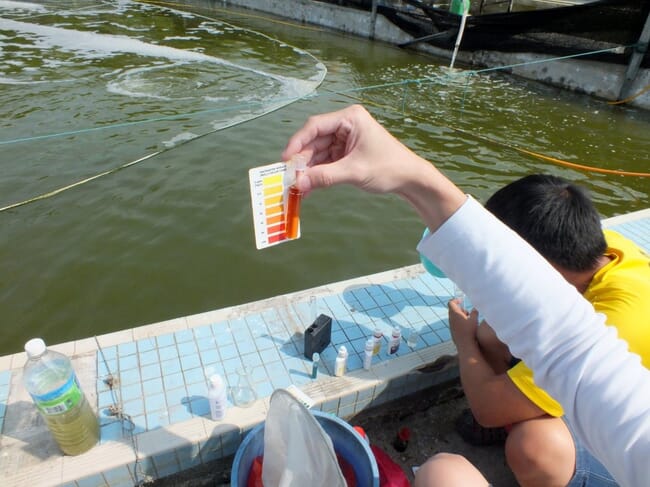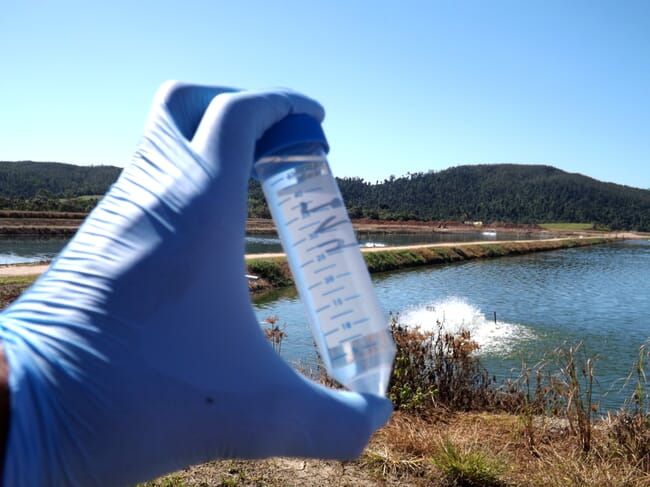A recent paper in Aquaculture Reports outlines the ways bacillus-based probiotics can improve water quality and reduce pollution in aquaculture. The review highlights various studies where deploying bacillus directly into aquaculture water improved water quality parameters like transparency, pH and nitrogen load. It also explains how bacillus bacteria clean up oil spills and organic waste.
The research team notes that though probiotics can mitigate many water pollution issues in aquaculture, there isn’t much evidence on how to optimise their use. Key information for producers – like which strain of bacillus
is best suited for a specific issue, the optimum water temperature or method of delivery – are still unknown.

© Kazi Ahmed Kabir
The authors argue that researchers must now focus their efforts on understanding bacillus’ genetic makeup and how the microbes interact with their surrounding environment at the molecular level. This in-depth information would let producers use probiotics more efficiently – ensuring they remain a cost-effective solution to a range of production issues.
Aquaculture’s water pollution woes
Intensive aquaculture comes with environmental drawbacks. Effluents from production can be a major source of pollution and can degrade water quality in the surrounding ecosystem. Residual production inputs like uneaten feed and fertilisers can increase the phosphorous and nitrogen load in the water. As these nutrients accumulate, they can harm the surrounding environment.
The aquaculture industry has made moves to address the issue. Relocating production on-shore and investing in tech-heavy recirculation systems are popular solutions, but these are beyond the budgets of many fish farmers.
Some producers have turned to probiotics as a reliable way to remediate aquaculture wastewater. Probiotics, especially bacillus, can manage water quality by producing spores and metabolites that keep pathogenic microbes at bay. They are also cheap and easy to use, making them accessible to small- and medium-sized aquaculture operations.
However, using probiotics to successfully manage water quality depends on multiple factors – chemical parameters like metal ions in culture water and dissolved oxygen levels can impact the way the microbes sporulate. The various strains of bacillus also operate differently, meaning that one microbe may not tackle every water quality issue that emerges on site.
Why bacillus bacteria could improve water quality
The benefits of probiotics start at the molecular level and provide significant advantages as production continues. Aquaculture producers can co-opt bacillus’ natural functions to improve pond conditions without having to invest in costlier solutions.

© Khoo-eng Wah
This starts by taking advantage of the role bacillus bacteria play in the nitrogen cycle. The cycle begins by using bacillus bacteria to convert organic wastes into ammonium and ammonia. These compounds are then broken down further into nitrites and then into nitrogen gas – removing nitrogen from pond water and sending it into the atmosphere.
Bacillus probiotics are also incredibly efficient at breaking down organic matter and phosphate wastes. They convert waste into CO₂ instead of slime or bacterial biomass. They also produce particulate food materials from the dissolved organics – recycling nutrients in the water column.
Producers can also use bacillus to maintain their ponds’ microbial community and chemical oxygen demand. The presence and stability of bacillus probiotics ensures that no single microbial species dominates the environment, leading to a healthier culture environment.
Bacillus supplementation increases appetites in fish and shrimp. This comes with two significant benefits for producers: the fish can achieve optimum growth levels and water quality improves since there is less uneaten food in pond water.
Bacillus’ track record for water quality
After reviewing the literature, the researchers found that bacillus probiotics were effective in modulating alkalinity and pH in culture water. Some studies note that they could be used to soften hard water and decrease heavy metal concentrations. There was also evidence that the microbes can safely reduce nitrogen and phosphate levels without damaging the surrounding environment.

© Giana Gomes
Other water quality indicators – like overall transparency, total dissolved solids and total organic matter – can be effectively managed with bacillus. The researchers note that since the microbes are efficient decomposers, they are able to break down organic matter and solids in culture water. This in turn improves the water’s transparency.
The researchers also evaluated studies where probiotics were used to address problems that emerged during production. They noted studies that used probiotics as an environmentally friendly way to break down oil spills – but that this had not yet been applied to aquaculture.
On a related note, the researchers believe that bacillus’ ability to lower disease occurrence in fish farming could help maintain water quality as a downstream benefit.
The unknowns of probiotics
There are significant gaps in the literature. The effect of bacillus use on key water quality parameters like dissolved oxygen isn’t widely reported. There is also little evidence on the relationship between bacillus and other water parameters like temperature, salinity and conductivity.
Most studies on probiotics in aquaculture are oriented towards nutrition, not water quality. The researchers stress that this gap is a missed opportunity. Bacillus show incredible potential for managing water quality but researchers now need to establish the optimum parameters for their use.




